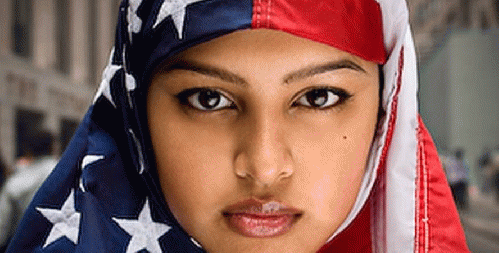It was founded on the principle of freedom of faith, but the United States has since turned toward an apparent fear of religion. Or, more specifically, one religion in particular.
Just ask Donald Trump, leading candidate for Republican presidential nomination. "Islam hates us," he hollers, and Trump even wants to block Muslims from entering the U.S. His close opponent Ted Cruz agrees with him on that subject, too.
Unfortunately, the American public is following that trend, as well, and with apparent and even acknowledged ignorance. Even though a huge 83 percent of U.S. citizens admit they know nothing about it, a 47-percent plurality believe that the Muslim faith is in conflict with the American way of life.
But not only are those fears and freakisms invalid, but it's Muslims in the United States who actually hold strongest to the country's freedoms. And who feel that those freedoms specified in the First Amendment of the U.S. Constitution -- speech, press, religion, peaceful protest, and government petition -- are still quite strong.
A recent Gallup Poll, conducted on behalf of the Knight Foundation, shows that American Muslims have notably higher confidence than all U.S. adults in the status of First Amendment rights.This public perception of the Muslim faith, then -- that it somehow restricts principles of freedom or suppresses the public -- is very far off. In fact, since these First Amendment rights were the foundation of this country, Muslims in the U.S. are actually much more American than most Americans.
Muslims are also more likely to believe that freedom of speech has grown stronger over the last two decades. While still rather split, a plurality of 37 percent of Muslims think it's stronger today, while a 40-percent plurality of all American adults think freedom of speech is now weaker.
Unfortunately, Muslims -- who make up only one percent of the U.S. population -- are more likely to believe that American society does not accommodate minority religions. A mild 44-percent plurality of American Muslims do think there's adequate accommodation, but 42 percent disagree.
And sadly, Muslims are correct in that perception. Not only does the country fail to accommodate different religions, but it's actually growing in repression of that freedom, too.
Restrictions on religion in the U.S., for example, received "moderate" scores in government restrictions (1.6) and social hostility (1.9) in a 2007 study by Pew Research. By 2013, however, those scores for the U.S. rose to 3.0 in government restrictions and 3.1 in social hostility. That's not as bad as repressive countries like Pakistan, but the U.S. still ranks lower than far-off nations like South Africa and the Congo.
This is happening to our other First Amendment rights, as well. While we rank fifth in freedom of speech, the U.S. is continuously slipping in freedom of the press, and now ranks 49th in the World Press Freedom Index.
And according to the Social Progress Imperative, the United States has "relative weakness" in freedom of assembly in comparison to other nations. We also only rank 15th in tolerance of others, 15th in personal freedom, and just 24th in personal rights.
(Note: You can view every article as one long page if you sign up as an Advocate Member, or higher).








